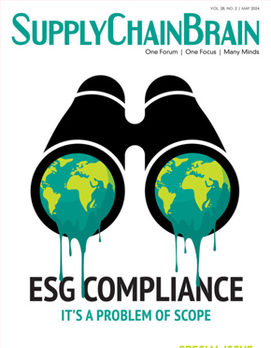
October of 2013 saw an all-time high for total intermodal revenue movements in the U.S., and the upward trend is continuing. "We are entering record territory now," said Lawrence Gross, senior consultant with FTR Associates.
Gross moderated a panel on the state of intermodal at the recent annual meeting of the National Industrial Transportation League. The news for intermodal providers, which have struggled for years to match the service levels of long-haul trucking, was almost unremittingly positive.
Much of the growth has come from the domestic side - meaning that intermodal services are encroaching on truckers to an extent not previously seen. International movements were about half those of domestic in terms of equipment movements, said Gross. Year-to-date intermodal growth (as of October) was 6.6 percent for domestic and just 1.4 percent for international.
Part of the disparity is due to the tendency of shipping lines to turn back ocean containers at ports of entry into the U.S. They're eager to get the boxes back to Asia for another import load, which is their chief source of revenue. So freight from those containers will often be transloaded into larger domestic equipment, whether trailers or containers, for movement to inland points.
Traditionally, the intermodal option has been economically feasible only for the longest hauls - say, Los Angeles to Chicago. But a lot of the industry's recent growth has come in the form of business in shorter lanes, said Gross.
The reason: rail service is becoming faster and more reliable. Intermodal is gradually chipping away at the time advantage that over-the-road trucks have long enjoyed. Higher fuel prices are driving more freight onto the rails, where operating costs are already lower. As a result, hauls of 500 to 600 miles are now being considered serious candidates for intermodal.
Freight moving off the West Coast began converting to intermodal when diesel fuel prices hit $1.75 per gallon, said Donald Broughton, chief marketing strategist with Avondale Partners LLC. At its current level of around $3.75, a similar trend is now happening in the eastern U.S., where the length of haul is typically shorter.
There's a limit, however, to how abbreviated intermodal service can be. Short-haul corridors continue to be dominated by trucks. The average intermodal haul is 1,430 miles for domestic freight, and 1,575 miles for international, said Gross.
Tony Hatch, analyst and financial consultant with his own firm of ABH Consulting, suggested that domestic intermodal is making up for the sharp drop in demand for coal movements. The rail industry, he said, "is on the verge of a revolution in profitability," driven in large part by new domestic container and trailer business.
"With coal out of the way, railroads will have to look for investment opportunities," Hatch said. "The top one is intermodal."
Oil prices might rise and fall, but they'll remain high over the long term, promising additional opportunities for intermodal, Hatch said. The trucking industry, meanwhile, continues to grapple with new regulations that threaten to degrade driver productivity, including stricter hours-of-service rules and the Compliance, Safety, Accountability (CSA) directive of the Federal Motor Carrier Safety Administration.
Meanwhile, railroads will get a boost in the coming year from the shale oil bonanza, reindustrialization and its impact on the chemicals industry, an increase in grain shipments, and the long-awaited housing recovery. All of those events are more likely to benefit the rails, which can economically haul much higher volumes of materials such as the sand needed for fracking at oil and natural gas deposits.
The recovering automotive industry will also give railroads a shot in the arm, particularly in the corridors linking up with Mexico. New factory investments in that country "are terrific for intermodal," Hatch said. "The railroads are positioning their big-money chips where the future is going to be."
Trucking companies are themselves getting into the act, tendering domestic containers and trailers to railroads for long hauls. Swift Transportation wants to grow its intermodal business to $1bn a year within five years. J.B. Hunt Transport, Inc. is adding "container after container" to its fleet. Hub Group, Inc., one of the nation's largest intermodal marketing companies, is making a similar commitment to intermodal growth.
One caveat: Broughton said this huge influx of new capacity will keep intermodal rates down for the immediate future. "Quite frankly," he said, "we're going to have to see a real stairstep in demand before there's a big increase in pricing, because everyone's throwing capital at it."
The truckers' plight is, of course, far worse. According to Broughton, the average monthly miles traveled per truck is now under 9,000 - a drop of 1,500 miles between 1998 and 2013. The decline in length of haul is directly attributable to the success of intermodal rail transport. And the loss of that business is resulting in a "double whammy" for truckload operators, Broughton said, since it creates more empty capacity, which further drives down truck rates.
Broughton said a combination of factors - including hours-of-service restrictions and the new electronic on-board recorders being mandated by FMCSA - are responsible for squeezing truckers' margins. He expects another "bleedout" of capacity at some point, as the industry wrestles with a heavy debt load and the need to invest in new equipment. Meanwhile, intermodal thrives.
"The next time we have any economic malaise, in addition to regulatory concerns, it may make previous waves [of trucking industry consolidation] child's play by comparison," Broughton warned.
Keywords: supply chain, supply chain management, trucking industry, intermodal services, transportation services, logistics services, supply chain planning, retail supply chain, railroad industry




.jpg?height=100&t=1715228265&width=150)


